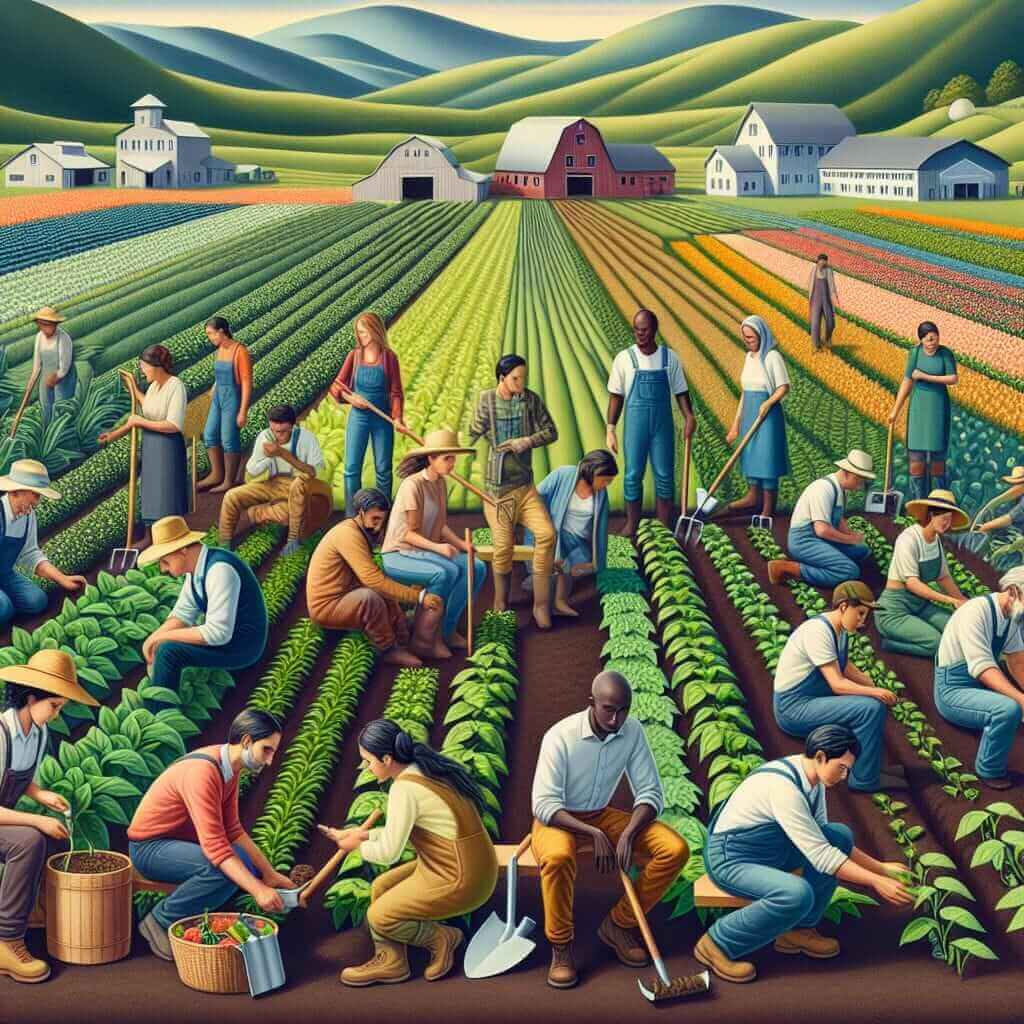The Reading section in the IELTS exam requires students to dissect and comprehend a variety of texts. These texts are often derived from current issues and academic debates, making topics like “sustainable agriculture in the 21st century” highly relevant. Sustainable agriculture remains a hot topic in our globalized world. Its presence in past IELTS exams indicates its ongoing significance. This article will help you prepare for such examinations by providing a detailed practice reading test, questions, answers, and additional study material.
Practice Reading Test
The Challenges of Sustainable Agriculture in the 21st Century
Passage
In the 21st century, sustainable agriculture has emerged as a critical issue due to increasing concerns over environmental degradation, population growth, and the need for robust food security systems. Although sustainable farming practices aim to preserve resources and provide economic viability for farmers, several significant challenges interfere with these objectives.
Firstly, climate change presents a substantial barrier. Unpredictable weather patterns, increased temperatures, and erratic rainfall have severely impacted crop yields worldwide. The result is often crop failure, leading to food shortages and increased prices. Technological advancements, such as drought-resistant crops, offer some respite, but they are not yet widely accessible or affordable for all farmers.
Secondly, soil degradation diminishes agricultural productivity. Intensive farming practices, overuse of chemical fertilizers, and deforestation have led to soil erosion and loss of fertile land. Sustainable agriculture must focus on soil health through practices like crop rotation, organic farming, and reduced tillage.
Thirdly, water scarcity is another pressing issue. Irrigation consumes vast quantities of freshwater, yet this resource is becoming increasingly scarce. Efficient water management and the adoption of drip irrigation systems can help mitigate this problem but require significant investment and training.
Additionally, the economic hurdles cannot be overlooked. Many sustainable agricultural techniques entail higher upfront costs, making them inaccessible for smallholder farmers. Access to credit and financial support must be improved to facilitate the adoption of sustainable practices.
Lastly, policy and regulatory challenges also impede progress. Fragmented guidelines and lack of enforcement make it challenging to implement sustainable agriculture uniformly. Governments need to establish and monitor robust policies that encourage sustainable practices.
In conclusion, while the goals of sustainable agriculture are laudable, they are hindered by various interrelated challenges. Addressing these issues requires a multi-faceted approach, including climate adaptation measures, soil conservation practices, sustainable water usage, economic support for farmers, and consistent policy regulation.
Practice Questions
Multiple Choice
-
What is the primary aim of sustainable agriculture?
a) Immediate high crop yields
b) Resource preservation and economic viability
c) Reduction of farming labor
d) Increased use of chemical fertilizers -
Which of the following is NOT mentioned as a challenge to sustainable agriculture?
a) Climate change
b) Soil degradation
c) Water scarcity
d) Shortage of arable land
True/False/Not Given
-
Technological advancements have resolved all issues related to climate change in sustainable agriculture.
a) True
b) False
c) Not Given -
Governments are unanimous and proactive in their policies on sustainable agriculture.
a) True
b) False
c) Not Given
Matching Headings
-
Match the following headings with the paragraphs:
a) Climate Change
b) Soil Conservation
c) Water Management
d) Economic Challenges
e) Policy and Regulation
Summary Completion
- Fill in the blanks
While (a) presents a significant challenge to crop yields, (b) involves the adoption of practices like crop rotation to maintain soil health. Efficient water management systems like (c) help conserve water, though they require substantial (d).
Answer Keys
Answers and Explanations
- b) Resource preservation and economic viability – The passage highlights that sustainable agriculture aims to preserve resources and provide economic benefits.
- d) Shortage of arable land – The passage discusses various challenges but does not mention the shortage of arable land explicitly.
- b) False – The passage notes that technological advancements help but have not resolved all issues.
- b) False – The passage mentions fragmented guidelines and enforcement issues, indicating a lack of unanimity and proactive policy.
-
- Climate Change – First paragraph after introduction
- Soil Conservation – Second paragraph
- Water Management – Third paragraph
- Economic Challenges – Fourth paragraph
- Policy and Regulation – Fifth paragraph
- (a) climate change, (b) soil conservation, (c) drip irrigation systems, (d) investment and training.
Common Mistakes
One common mistake is misinterpreting the given information for true/false/not given questions. Ensure you read the passage carefully and distinguish between presented facts and additional inferred details.
Vocabulary
- Degradation (noun, /ˌdɛɡrəˈdeɪʃən/): the condition or process of degrading or being degraded.
- Viability (noun, /ˌvaɪəˈbɪlɪti/): the ability to work successfully.
- Mitigate (verb, /ˈmɪtɪɡeɪt/): to make less severe or serious.
- Fragmented (adjective, /ˈfræɡmɛntɪd/): broken into separate parts.
Grammar Focus
Pay attention to complex sentence structures and passive voice usage in academic writing. For instance, “Efficient water management systems can help mitigate this problem” uses the passive voice to emphasize the action more than the subject performing the action.
Advice for High IELTS Reading Scores
To excel in the Reading section, practice with a variety of topics to build your comprehension skills. Focus on understanding the main idea and details in each paragraph. Time management is crucial, so practice completing passages within the given time limits. Use skimming and scanning techniques to locate answers quickly.

For related reading materials, you can explore articles on “The Challenges of Global Food Security in the 21st Century” and “The Effects of Climate Change on Agriculture.”
Happy studying!